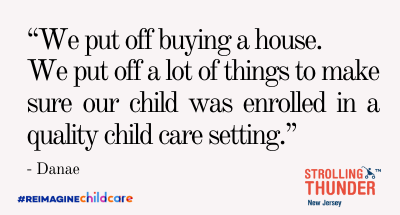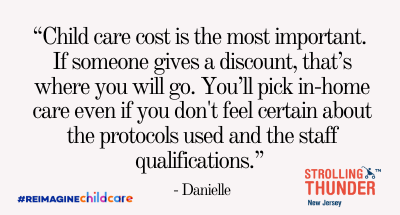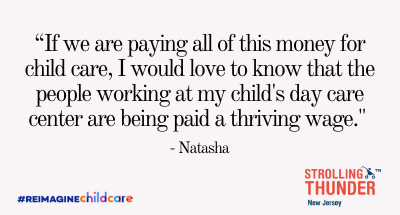Posted on July 19, 2021
Thank you to parents across the state for attending Strolling Thunder NJ 2021 and giving their voice to a reimagined child care system in New Jersey. More than 60 parents participated in the event on June 9th. In addition to a parent panel discussion, small group breakout sessions were facilitated by parents to discuss critical issues of access, affordability and quality of child care.
We have shared their input with Acting Commissioner Adelman from the New Jersey Department of Human Services, the department that manages the child care subsidy program and Grow NJ Kids, our state’s quality and improvement rating system.
Here's what NJ parents said:
Make child care more affordable. Ideally child care should be free to all families who need it. Many parents compared child care to the public education system and urged that it be funded the way schools are funded. At minimum, income eligibility for subsidized care should be expanded, making more families eligible for assistance. A sliding fee scale should be developed to assist families at higher income levels.
Increase child care subsidy rates to increase the supply of quality child care. Additional funding to increase subsidies will increase the supply of centers that accept subsidy and provide quality care, especially for infants and toddlers. This will expand the parent’s ability to find quality child care.
Pay early childhood educators more. Expanded funding for early childhood educators would help assure program quality and reduce staff turnover. Additionally, pay family members who are providing care for children beyond the current funding for FFN care.
Ensure program flexibility and diversity. More child care is needed offering flexible hours as well as a culturally congruent curriculum, especially for learners whose primary language is not English.
Improve information systems so that they are less burdensome and more accessible. Easier to navigate systems (people, processes, technology) are needed to help parents apply for subsidies or find quality centers. Referral to a website is not enough. Parents need help in finding child care and entities to provide that help, like the child care resource and referral agencies, must be supported to provide that assistance.
Address learning gaps due to COVID. Acknowledge that children ages 0-3 have "lost" educational skills and developmental delays due to COVID and greater public investment will be needed in order to close their learning gaps and social/emotional developmental needs.
Change the negative image of subsidized care. Address the perception that subsided care equates to lower quality care. Many parents either stated this or reflected this sentiment in their comments.





